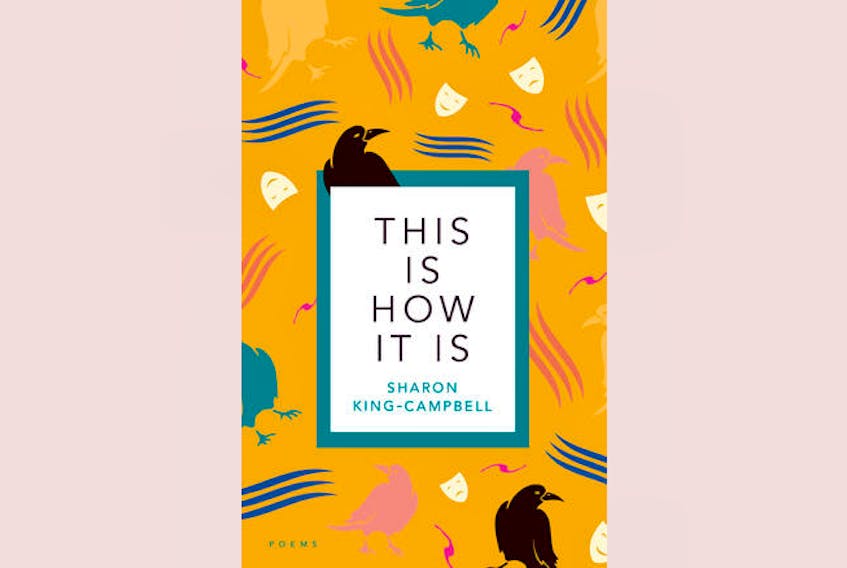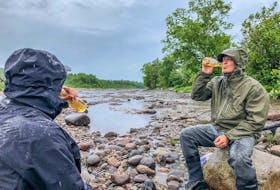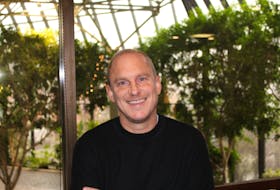If you ask Wikipedia: "What is a poem?" it will answer: “Poetry is a form of literature that uses aesthetic and often rhythmic qualities of language — such as phonaesthetics, sound symbolism, and metre — to evoke meanings in addition to, or in place of, the prosaic ostensible meaning.” Poetry is a purpose-built vehicle for a kind of compact, immersive telling of sensations, emotions, and memories. In calibrating this intent, nothing else will do.
Sharon King-Campbell’s “This Is How It Is” contains 70 poems, the longest running full pages, the shortest a haiku.
Format includes ragged right spacing, separate stanzas, and occasional solid blocks. Some are separately titled while others simply unfold from their first line.
King-Campbell’s “Field Notes,” which was longlisted for the 2020 CBC poetry prize, is included.
Some depict classical, or biblical (Delilah, Salome) figures.
“For Clara Schumann” opens, unexpectedly, with a domestic chore: “She hangs the laundry herself / family of six and she alone is / able to take care. Each note a step forward / the paying of a bill: coal or electrics, / medicine. Her husband weightless in his mind / but heavy in his body. The burden of him.”
“Cook Street” maps “another street named for a sailor. / The man has statues, vistas, thoroughfares / in Australia and the Indies to remember him … Down the road, a bar named for a pirate. / Sailor-thieves, the pair of them, here in this city / named for the man who lost his head / to Herod all those years ago.”
Under “Ice Fog” takes in the late winter weather: “but then a single afternoon with blue / in sky, a naked sun, we flood the streets / afloat, forgiving / Good spring, we say, as if that / could possibly be true.”
More personal situations shape “Marlborough Sounds”: “Once, you clattered down the stairs / and out. If you’d been quieter / I might have missed you giving up / on the act, the place, on me. / I clattered too, over sunny bricks on Cuba Street, dodging, / diving between walkers and when my comedy crashed into / your drama like your face into my neck / we shook together.”
“Field Notes” embeds the arc of daybreak within a feathered span. “On the fusion of horizons, we find / ourselves blinded by the possible / rising, full of fire, white light refracted / like a peacock’s tail. Materiality / spreads a spectrum of energies, / frenetic reds and idle violets encoded / on our retinas, the texture of linoleum / or beach stone. The peacock tells his own /
story. So does the stone.”
Then there’s the tumbling decrescendo of “Haydn Wrote”: “A letter every month. She never / reads them. Envelopes still sealed / and yellowing, the inky address turning / brown. She writes him, too; in case / he opens them she includes some detail / of a conversation with a shared acquaintance / invents well-wishes from them as if she’d / spoken of him at all. This suits them both. …”
Seasons pinwheel from winter to spring and back. “January has no business / warming up like this. / It sticks to your skin. Today / the World Health Org declared / climate change a threat. Of course / it causes famine, and that causes war / - that’s half the horsemen -”
And the side-by-side pieces “advice my father gave me,” and “advice my mother gave me,” (both full of gems), balance and counterbalance those influences. The first counsels “most choices are reversible. / go everywhere. / fear is not the obstacle that wins”; the second to “stop reading / go outside / let someone else cook / when you’re on holiday / there’s no point in having money / you refuse to spend”
Knitted with this thread, the titular poem burrows to some familial core. “When I was small my father / lived away. My mother / a not-single single parent / weeks at a time. I remember / I missed him. I remember / I barely noticed mom did the cooking, / did the lunches, did the tucking in. This / is how it is: my dad / was working far away. …”
This is a book about journey, touching on different kinds of travel. Across the globe, through perspective, and into the past.
The words have traction, trekking in various realms, where King-Campbell guides us through how it is.
Joan Sullivan is editor of Newfoundland Quarterly magazine. She reviews both fiction and non-fiction for The Telegram.









